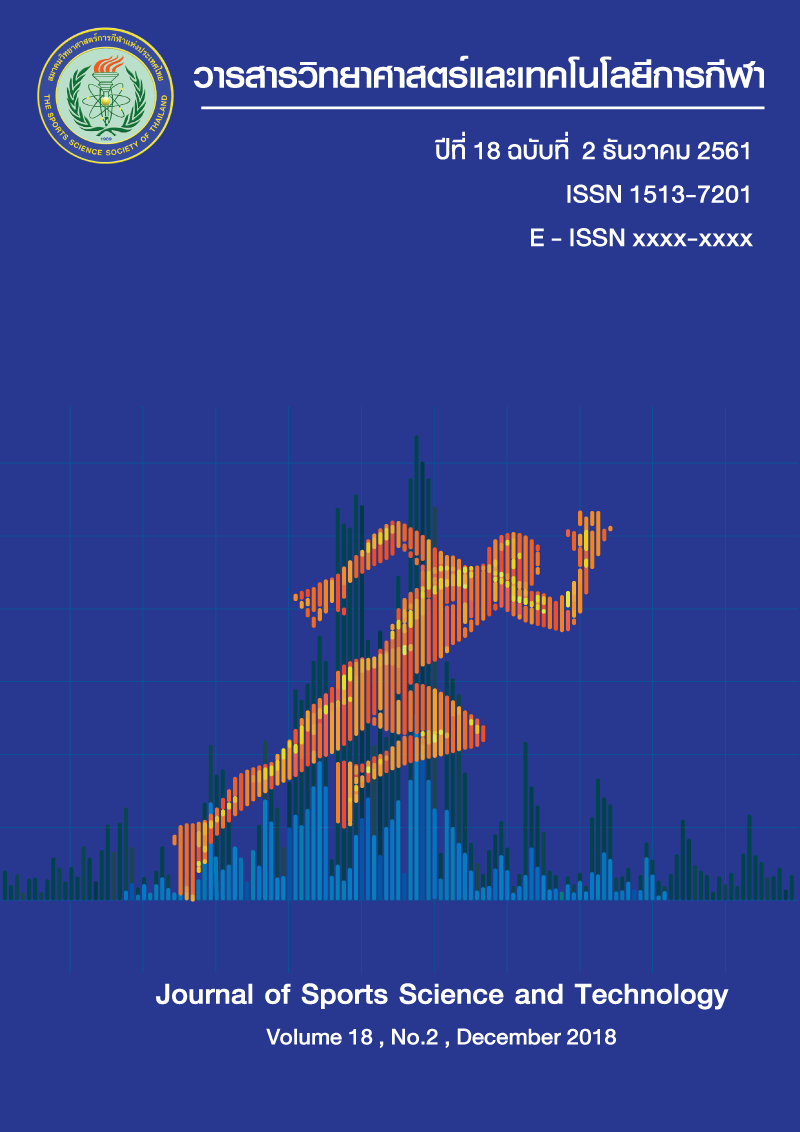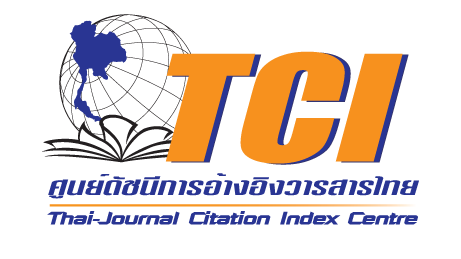THE EFFECTS OF SLEEP DEPRIVATION ON BRAIN WAVES, LOUNGHBOROUGH SOCCER PASSING TEST AND MOODS IN COLLEGIATE SOCCER PLAYERS
Keywords:
Loughborough soccer passing test / Electroencephalogram / Fatigue/ VigorAbstract
Introduction: Soccer is one of the popular sports in Thailand. Sleep deprivation have found in the players who frequency travel for the game away home which may impair the ability to perform mental and physical tasks. However, there are no data about the effects of sleep deprivation on brain waves, specific soccer skills and moods in collegiate soccer players. Therefore, the purpose of this study was to compare brain waves, soccer passing skills and moods between normal sleep (CN) and sleep deprivation (SD) condition in collegiate soccer players. Methods: Eleven male soccer players in age range 18-21 years volunteered to participate in randomized crossover design study. Participants were measured resting-eye closed electroencephalogram (EEG) recording, Lounghborough soccer passing test (LSPT) and Thai-Brunel Mood Scale (Thai-BRUMS) at 4.00 pm. after completed each sleep condition; CN (sleep 7 hours) and SD (sleep 10.30 pm.-2.00 am. and keep awake after sleep). Results: Delta waves at midline frontal electrode (Fz), theta waves at Fz electrode, Time taken only of LSPT and fatigue mood were significantly increased in SD condition compared to CN condition (p<0.05). Alpha waves at midline central electrode (Cz), alpha waves at midline parietal electrode (Pz), beta waves at Pz electrode and vigor mood were significantly decreased in SD condition compared to CN condition (p<0.05), whereas there were no significant differences in penalty time, performance time of LSPT and other moods. Conclusion: SD resulted in the partial changes of the brain waves, which indicated drowsiness, decreased alertness and attention. It also found the delayed passing ball which indicated decreased gross motor required to pass the ball. In addition, SD also resulted in the decreased vigor mood and increased fatigue in athletes, indicating a lower power state and the tiredness of athletes following SD. Therefore, the results of this study can be recommended optimal sleep hours for soccer players, especially, SD at the night before the match which can affect losing or winning of the game.
(Journal of Sports Science and Technology 2018; 18(2): 21-34)
*Corresponding author: Amornpan AJJIMAPORN College of Sports Science and Technology, Mahidol University, Nakorn Pathom,Thailand 73170 E-mail: g4036011@gmail.com
References
2. Alhola P, Polo-Kantola P. Sleep deprivation: Impact on cognitive performance. Neuropsychiatr Dis Treat. 2007;3(5):553-67.
3. Mah CD, Mah KE, Kezirian EJ, Dement WC. The effects of sleep extension on the athletic performance of collegiate basketball players. Sleep. 2011;34(7):943-50.
4. Dinges DF, Pack F, Williams K, Gillen KA, Powell JW, Ott GE, et al. Cumulative sleepiness, mood disturbance and psychomotor vigilance performance decrements during aweek of sleep restricted to 4-5 hours per night. Sleep. 1997;20(4):267-77.
5. Sleep Deprivation and Sports Performance [Internet] [cited 2016 October 10]. Available from: https://www.sjsd.net/~rkangas/S0290194F.5/Sleep%20Deprivation%20and%20Sports%20Performance.pdf2016
6. Banks S, Dinges DF. Behavioral and physiological consequences of sleep restriction. J Clin Sleep Med. 2007;3(5):519-28.
7. Spiegel K, Leproult R, Van Cauter E. Impact of sleep debt on metabolic and endocrine function. Lancet. 1999;354(9188):1435-9.
8. Spiegel K, Leproult R, Colecchia E, L'Hermite-Balériaux M, Nie Z, Copinschi G, et al. Adaptation of the 24-h growth hormone profile to a state of sleep debt. Am J Physiol Regul Integr Comp Physiol. 2000;279(3):874-83.
9. Dinges D, Douglas S, Zaugg L, Campbell D, McMann J, Whitehouse W, et al. Leukocytosis and natural killer cell function parallel neurobehavioral fatigue induced by 64 hours of sleep deprivation. J Clin Invest. 1994;93(5):1930-9. 10. Sawant HK, Jalali Z. Detection and classification of EEG waves.Oriental J Comput Sci Technol 2010;3(1):207-13. 11. Verweij IM, Romeijn N, Smit DJ, Piantoni G, Van Someren EJ, van der Werf YD. Sleep deprivation leads to a loss of functional connectivity in frontal brain regions. BMC Neurosci. 2014;15:88.
12. Azboy O, Kaygisiz Z. Effects of sleep deprivation on cardiorespiratory functions of the runners and volleyball players during rest and exercise. Acta Physiol Hung. 2009;96(1):29-36.
13. Mehrdad H, Sohrab G, Naser B. The effects of 30 hours sleep deprivation on basic football skills of soccer players. Pedagog Psychol Med-Biol Probl Phys Train Sports. 2012(7):137-41.
14. Reilly T, Deykin T. Effects of partial sleep loss on subjective states, psychomotor and physical performance tests. J Hum Movement Stud. 1983;9:157-70.
15. Meney I, Waterhouse J, Atkinson G, Reilly T, Davenne D. The effect of one night's sleep deprivation on temperature, mood, and physical performance in subjects with different amounts of habitual physical activity.Chronobiol Int. 1998;15(4):349-63.
16. Richmond LK, Dawson B, Stewart G, Cormack S, Hillman DR, Eastwood PR. The effect of interstate travel on the sleep patterns and performance of elite Australian Rules footballers. J Sci Med Sport. 2007;10(4):252-8.
17. Van der Cammen-van MH, IJsselstijn H, Takken T, Willemsen SP, Tibboel D, Stam HJ, et al. Exercise testing of pre-school children using the Bruce treadmill protocol: new reference values.Eur J Appl Physiol. 2010;108(2):393-9.
18. Sitasuwan T, Bussaratid S, Ruttanaumpawan P, Chotinaiwattarakul W. Reliability and validity of the Thai version of the Pittsburgh Sleep Quality Index.J Med Assoc Thai. 2014;97(3):57-67.
19. Campbell IG. EEG recording and analysis for sleep research. Curr Protoc Neurosci. 2009:10(2): 10-2
20. Ali A, Williams C, Hulse M, Strudwick A, Reddin J, Howarth L, et al. Reliability and validity of two tests of soccer skill. J Sport Sci. 2007;25(13):1461-70.
21. C C. The Brunel Mood Scale. Translated to Thai by the permission of Peter C. Terry & Andrew M. Lane. 2008.
22. Brunner DP, Dijk D-J, Borbély AA. Repeated partial sleep deprivation progressively changes the EEG during sleep and wakefulness. Sleep. 1993;16(2):100-13.
23. Ferreira C, Deslandes A, Moraes H, Cagy M, Pompeu F, Basile LF, et al. Electroencephalographic changes after one nigth of sleep deprivation. Arq Neuropsiquiatr. 2006;64(2B):388-93. 24. Yin Y, Zhu Y, Xiong S, Zhang J. Drowsiness Detection from EEG Spectrum Analysis. Informatics in Control, Automation and Robotics: Springer; 2011;753-9.
25. Klimesch W. EEG alpha and theta oscillations reflect cognitive and memory performance: a review and analysis. Brain Res Rev. 1999;29(2-3):169-95. 26. Sadato N, Nakamura S, Oohashi T, Nishina E, Fuwamoto Y, Waki A, et al. Neural networks for generation and suppression of alpha rhythm: a PET study. Neuroreport. 1998;9(5):893-7.
27. Hariri AR, Bookheimer SY, Mazziotta JC. Modulating emotional responses: effects of a neocortical network on the limbic system. Neuroreport. 2000;11(1):43-8.
28. Britton J, Frey LC, Hopp J, Korb P, Koubeissi M, Lievens W, et al. Electroencephalography (EEG): An introductory text and atlas of normal and abnormal findings in adults, children, and infants: Epilepsy Curr, Chicago; 2016.
29. Gorgoni M, Ferrara M, D'Atri A, Lauri G, Scarpelli S, Truglia I, et al. EEG topography during sleep inertia upon awakening after a period of increased homeostatic sleep pressure. Sleep Med. 2015;16(7):883-90.
30. Pallesen S, Gundersen HS, Kristoffersen M, Bjorvatn B, Thun E, Harris A. The effects of sleep deprivation on soccer skills. Percept Motor Skills. 2017;124(4):812-29.
31. Abedelmalek S, Chtourou H, Aloui A, Aouichaoui C, Souissi N, Tabka Z. Effect of time of day and partial sleep deprivation on plasma concentrations of IL-6 during a short-term maximal performance. Eur J Appl Physiol. 2013;113(1):241-8.
32. Souissi N, Sesboüé B, Gauthier A, Larue J, Davenne D. Effects of one night's sleep deprivation on anaerobic performance the following day. Eur J Appl Physiol. 2003;89(3-4):359-66.
33. Kim TW, Jeong J-H, Hong S-C. The impact of sleep and circadian disturbance on hormones and metabolism. Int J Endocrinol. 2015;2015.
34. Brandt R, Herrero D, Massetti T, Crocetta TB, Guarnieri R, de Mello Monteiro CB, et al. The Brunel mood scale rating in mental health for physically active and apparently healthy populations. Health. 2016;8(02):125-32.
35. Louca M, Short MA. The effect of one night's sleep deprivation on adolescent neurobehavioral performance. Sleep. 2014;37(11):1799-807.
36. Baum KT, Desai A, Field J, Miller LE, Rausch J, Beebe DW. Sleep restriction worsens mood and emotion regulation in adolescents. J Child Psychol Psychiatry. 2014;55(2):180-90.







